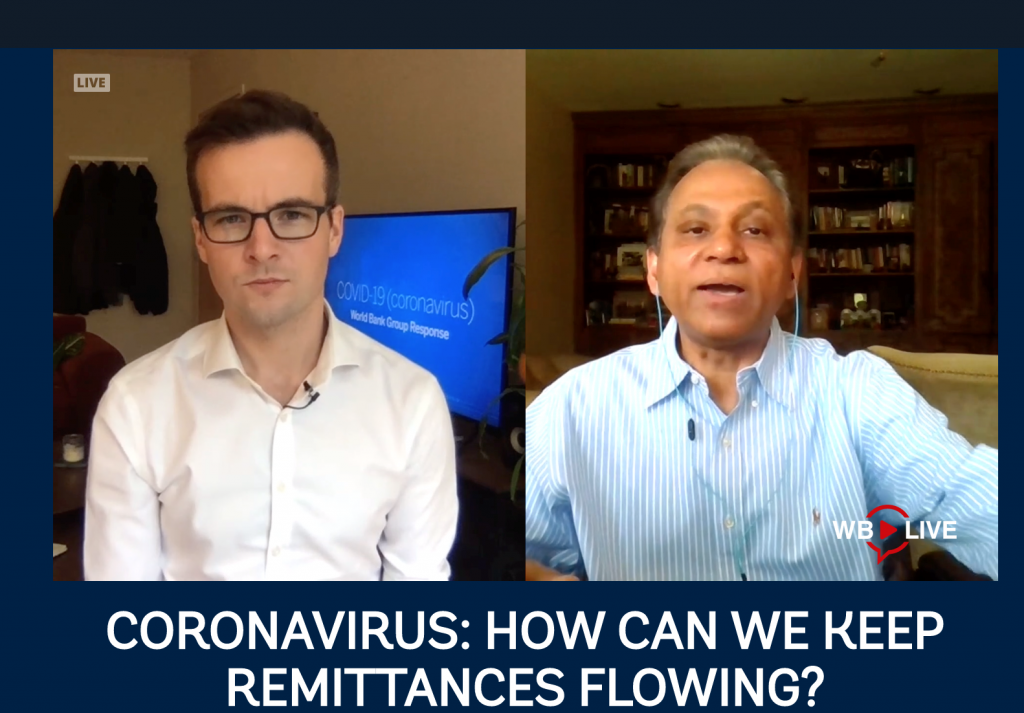The World Bank is projecting the largest decline in remittances in history, due to COVID-19. On April 23, 2020, The World Bank hosted a webinar with Dr. Dilip Ratha, Chief Economist Remittances unit at the bank on how we could keep remittances flowing. Here is an abridged version of the webinar.
Q: Can you give a broad overview of what’s going on?
Dilip: Globally $554 bn were sent last year, in remittances and we are expected this to drop to $445 bn – reduction by 20—30%. Rupture to poor countries. The human aspect is not to be underestimated. FDI, companies are sending it. The amounts sent are $100-$200 being sent in remittances. Perhaps a billion people are being impacted.
The main impetus for decline comes from the COVID crisis. Lockdown and social distancing. The main impact is coming when people don’t get jobs. Their incomes will fall and the inability to send money is impacted. There are other spillover effects that come from the fact that as economic activity comes down, there are ripple effects.
Q: Why is this decline so significant?
Dilip: There are about 270 million migrants around the world and most of them are in cities. In some cities, they maybe 40% of the population – NY, London, Paris, etc. These people sending these billions, are sending it to their families. This is used for consumption – food, education, healthcare, etc. The migrants who are sending money are poor, migrants. It has a huge poverty reduction impact. Nepal, South Sudan, Haiti, etc. sometimes remittances are 40%-50% of the income of the country and they are the lifeline for many people.
Given the shortage of food etc. that is being felt the impact could be severe, for food security as well.
Q: How’s pandemic impacting migration and labor?
Dilip: I don’t think migration has shifted significantly. There are travel bans, new migration is going to fall, but those who are here will stay. The stock of international migrants wont change much. In terms of internal migration, they are not able to go home, perhaps they’ll walk home – like in India. Villages have barricaded people.
There will be an impact over 6 months to a year.
Q: How are certain sectors going to be hit?
Dilip: In different countries, it may play out differently. There are two kinds of migrants. We see just one kind and not the other. The ones who are visible are doctors, white-collared professionals. NHS has a lot of doctors etc. The health sector is doing a little better. The agriculture sector is also in the news as there is a shortage of farm workers. That has huge implications for food security as agriculture season can be disrupted. Food prices are going up. What we don’t notice is the hospitality, retail sector, etc. they have been impacted as well.
Directly related to us is the money transfer industry. This is not considered an essential sector and we forget is that most of the people in the world don’t have access to digital services to send money. Most of the money sent it cash-to-cash (80%). Informal migrants send money through a store. Both the sending and receiving side of the stores are closed. This is a big impact on them.
Q: What’s the regional impact?
Dilip: The impact is global and declines in remittances may be historic, since the 1980s. In 2009, there was a drop of remittances of 5% and flow was above the pre-crisis.
The 2008 recession impacted just parts of the world. This crisis is impacting everyone, even in remote villages. That’s the context in which everything is impacted. Some will be impacted more than others.
Also, oil prices have fallen. Gulf and Russia are key for remittances. South Asia and North Africa receive a lot of remittances. The oil price issue is true in Russia. Rouble, the currency in Russia is also weakening in comparison to the US dollar. We are expecting the largest decline and global by about 20%.
Q: The bank is making $160 bn available over the next 15 months. What are some of the solutions?
Dilip: The policy response can be to think that a large number of migrants are human beings and are concentrated in urban economic centers. Like humans, they need to be included in part of our healthcare, social transfer responses. Also, the most urgent. Also, remittance is a lifeline, and making them ‘essential services’ is key. Finally, we know that the only way for us to send money is digital, and yet, we know that poor people who work in the informal sector, are unbanked. Having access to a bank account is critical to use digital means to send money. Yet, there is an urgent need to bring them to the banking sector so they can use digital means. Some barriers include regulation: Know your customer, ID checks. And some suspicion that small amounts are money laundering etc. We need to decriminalize this.
Q: What about stranded migrants?
Dilip: Some of the migrants are in labor camps, etc. and there are refugee camps. They don’t receive the attention they deserve. Migrants are ignored or discriminated against. Countries of origin can play a big role in bringing them back to their home communities. When they are in different places, they need cash transfer programs.
Q: How can we help migrants who may be facing discrimination?
Dilip: Migrants are also being seen as vectors. We need to reduce discrimination against migrants too. Some education program is also key.
How do you reach out to folks without IDs is the problem. There needs to be a mindset that we need to help people.

